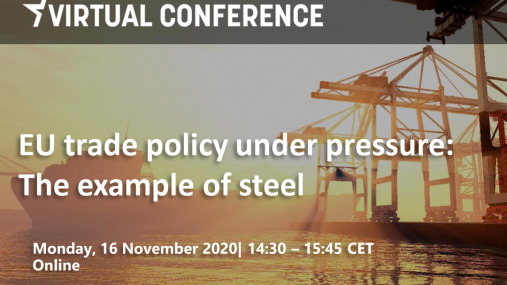
Downloads and links
Download files or visit links related to this content
News » EUROFER supported the 'EU trade policy under pressure: The example of steel' virtual conference
EUROFER supported the 'EU trade policy under pressure: The example of steel' virtual conference
Downloads and links
Recent updates
This event took place on 16 November.
The EU is at a crossroads, having suffered a sharp economic and social hit in recent months. The European Commission predicts a drop in EU GDP of 7.5 per cent in 2020. However, even in 2019, there were signs of underlying frailty in the EU economy.
Despite this, the EU has ambitious plans for its future, aiming to go green, digital and high-tech. But the global challenges remain the same: third countries taking advantage of the EU’s open borders and markets whilst refusing to share the same high ambition to decarbonise by 2050. EU trade policy is thus under pressure. It must evolve to meet rising competition abroad while giving the space for EU companies to
survive, thrive and go green.
This recession will have severe effects on global supply chains, especially if countries around the world seek to dump products on world markets to make up for a loss of local demand.
Join this EURACTIV Virtual Conference, supported by EUROFER, to discuss the crossroads we find ourselves at. If Europe is to thrive, how can EU trade be ready for a vastly different global future? How will industries, such as steel, fare? Questions to be discussed:
How can the multilateral trade framework be strengthened to ensure stability, predictability and a rules-based environment for fair and sustainable trade for EU companies?
16 November, 2020 - online.
14:30 – 14:35 Welcome
14:35 – 14:50 Panelists statements
14:50 – 15:40 Discussion and Q&A
15:40 – 15:45 Closing statements

Download files or visit links related to this content
Brussels, 13 February 2025 – Following the high-level conference “A Carbon Border Adjustment Mechanism for Climate - Addressing carbon leakage to strengthen global climate action”, organised in Paris by the European Commission and the French Ministries of Finance, Economics and Climate Transition, EUROFER emphasises that simplification must go hand in hand with ensuring the instrument’s effectiveness. This means addressing key issues such as resource shuffling, exports, and the inclusions of products further down the value chain.
Brussels, 11 February 2025
Brussels, 06 February 2025 – The economic and geopolitical conditions that have affected the European steel market over the past two years show no signs of improvement and have further deepened their negative impact on the sector in 2024. Growing uncertainty continues to weigh also on 2025 and 2026, with the outlook hinging on unpredictable developments especially as regards international trade. According to EUROFER’s latest Economic and Steel Market Outlook, the recession in apparent steel consumption in 2024 will be steeper than previously projected (-2.3%, down from -1.8%) and the expected recovery in 2025 has now been downgraded (+2.2%, down from +3.8%). Similarly, steel-using sectors’ recession has been revised downwards for 2024 (-3.3% from -2.7%), while growth projections for 2025 have also been lowered (+0,9% from +1.6%). Some acceleration is not expected until 2026 (+2.1%). Steel imports remain at historically high levels (28%) also in the third quarter of 2024.